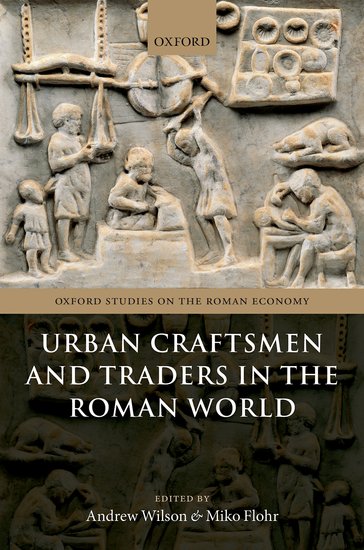Craftsmen and Traders in the Roman World
 Andrew Wilson and Miko Flohr (eds) (2016). Craftsmen and Traders in the Roman World. Oxford Studies on the Roman Economy. Oxford University Press. Oxford. Hardcover. 416 Pages / 75 illustrations. ISBN 9780198748489 (hardback); 9780198852902 (paperback).
Andrew Wilson and Miko Flohr (eds) (2016). Craftsmen and Traders in the Roman World. Oxford Studies on the Roman Economy. Oxford University Press. Oxford. Hardcover. 416 Pages / 75 illustrations. ISBN 9780198748489 (hardback); 9780198852902 (paperback).
This volume, featuring sixteen contributions from leading Roman historians and archaeologists, sheds new light on approaches to the economic history of urban craftsmen and traders in the Roman world, with a particular emphasis on the imperial period.
Combining a wide range of research traditions from all over Europe and utilizing evidence from Italy, the western provinces, and the Greek-speaking east, this edited collection is divided into four sections. It first considers the scholarly history of Roman crafts and trade in the nineteenth and twentieth centuries, focusing on Germany and the Anglo-Saxon world, and on Italy and France. Chapters discuss how scholarly thinking about Roman craftsmen and traders was influenced by historical and intellectual developments in the modern world, and how different (national) research traditions followed different trajectories throughout the nineteenth and twentieth centuries. The second section highlights the economic strategies of craftsmen and traders, examining strategies of long-distance traders and the phenomenon of specialization, and presenting case studies of leather-working and bread-baking. In the third section, the human factor in urban crafts and trade-including the role of apprenticeship, gender, freedmen, and professional associations-is analysed, and the volume ends by exploring the position of crafts in urban space, considering the evidence for artisanal clustering in the archaeological and papyrological record, and providing case studies of the development of commercial landscapes at Aquincum on the Danube and at Sagalassos in Pisidia.
With contributions by Carla Salvaterra and Alessandro Cristofori, Jean-Pierre Brun, Candace Rice, Kai Ruffing, Carol van Driel-Murray, Nicolas Monteix, Christel Freu, Lena Larsson Lovén, Wim Broekaert, Nicolas Tran, Ilias Arnaoutoglou, Penelope Goodman, Kerstin Dross-Krüpe, Orsolya Láng, and Jeroen Poblome.
Available in hardback (2016) and paperback (2020). More details at the website of OUP.


